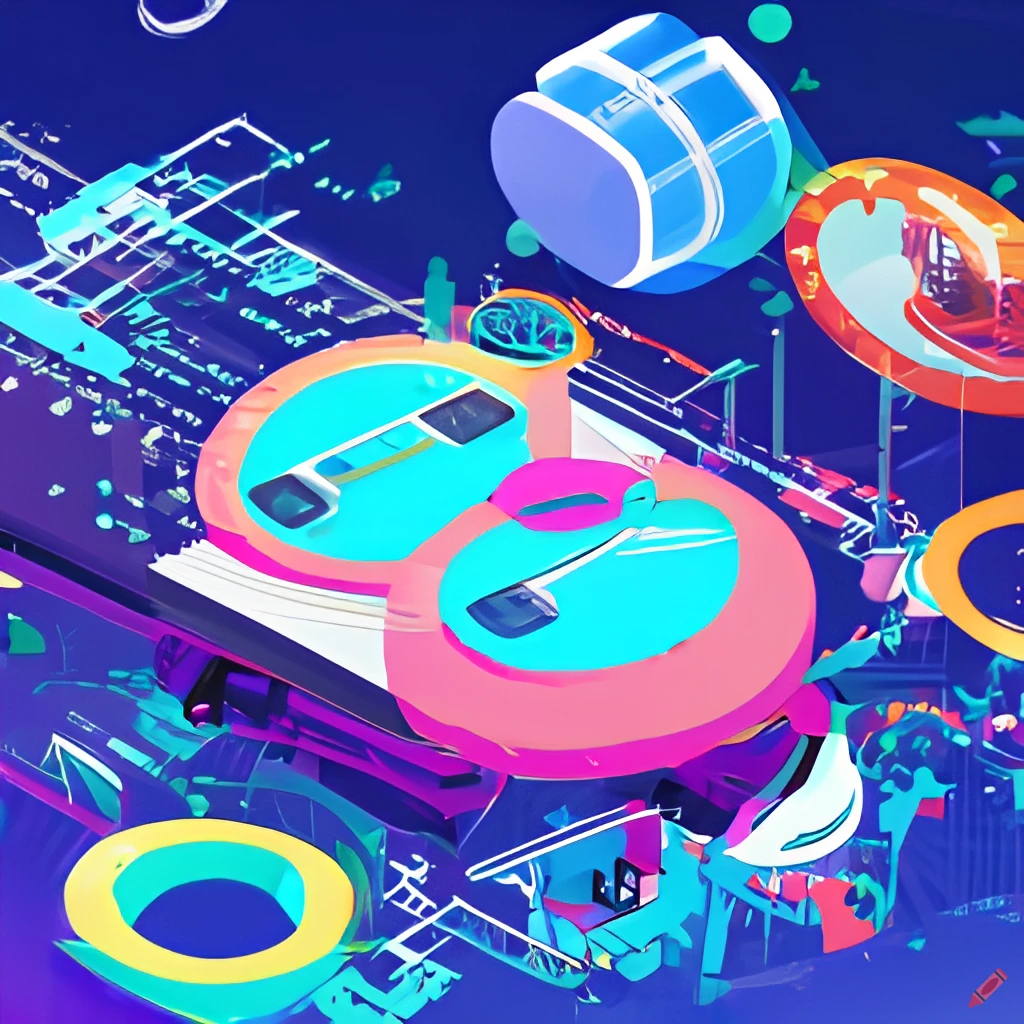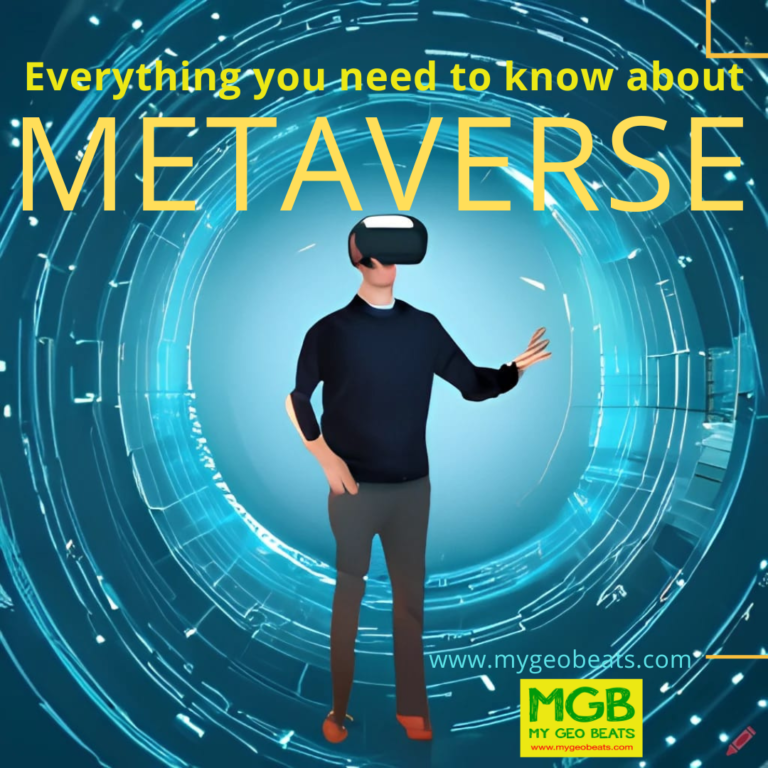“Metaverse: virtual reality universe”
The concept of the metaverse has been around for several decades, but it has gained significant attention in recent years, especially with the increasing popularity of virtual reality (VR) and augmented reality (AR) technologies. In simple terms, the metaverse refers to a virtual universe that is created by the convergence of physical and virtual spaces. It is a place where users can interact with each other, create and manipulate digital objects, and engage in various activities in a shared space.
Here are some of the things you may want to know about the metaverse:
What is the Metaverse?
The metaverse is a term that describes a fully immersive virtual world where users can interact with each other and digital objects. It is a digital space that is created by the convergence of different technologies, including virtual reality, augmented reality, and blockchain. The metaverse is envisioned as a place where users can work, play, learn, and socialize.
 How is the Metaverse different from Virtual Reality?
How is the Metaverse different from Virtual Reality?
Virtual reality (VR) is a technology that creates a fully immersive, computer-generated environment that simulates real-world experiences. The metaverse, on the other hand, is a virtual world that is created by the convergence of various technologies, including VR. The metaverse is more than just a VR experience, as it involves a shared virtual space where users can interact with each other, create and manipulate digital objects, and engage in various activities.
What are the benefits of the Metaverse?
The metaverse has the potential to revolutionize how we work, learn, play, and socialize. It can provide new opportunities for businesses to connect with customers, enable remote work, and improve collaboration among teams. It can also provide new avenues for education and training, as well as new forms of entertainment and social interaction.
What are the challenges of the Metaverse?
The metaverse is still in its early stages of development, and there are several challenges that need to be addressed. One of the biggest challenges is the development of standards that ensure interoperability and seamless integration across different virtual environments. There are also concerns about privacy, security, and the ethical implications of creating a fully immersive virtual world.
 What are some of the current examples of the Metaverse?
What are some of the current examples of the Metaverse?
There are already several examples of the metaverse in action. Some popular virtual worlds include Second Life, Minecraft, and Roblox. These platforms allow users to create their own avatars, interact with each other, and engage in various activities in a shared virtual space. Other examples of the metaverse include virtual marketplaces, such as Decentraland and The Sandbox, which allow users to buy, sell, and trade virtual assets using blockchain technology.
What is the role of blockchain in the Metaverse?
Blockchain technology is seen as a critical component of the metaverse, as it provides a decentralized and transparent platform for creating and managing digital assets. Blockchain technology allows users to create and trade digital assets in a secure and transparent way, without the need for intermediaries. It also enables the creation of decentralized autonomous organizations (DAOs) that can govern virtual worlds and provide new forms of economic and social organization.
What is the future of the Metaverse?
The future of the metaverse is still uncertain, but it is clear that it has the potential to transform how we live, work, and play. The metaverse is expected to become a multi-billion-dollar industry in the coming years, as more companies and developers invest in its development. It is also likely to become more integrated with our physical world, as technologies such as augmented reality and the Internet of Things (IoT) enable the creation of seamless virtual and physical environment.
How METAVERSE is going to be useful for businesses ?

- Enhanced customer engagement: The metaverse provides businesses with a unique opportunity to engage with their customers in new and exciting ways. Through immersive virtual experiences, businesses can offer customers a more engaging and memorable brand experience. For example, businesses can create virtual showrooms or stores where customers can explore products, try them on virtually, and make purchases in a seamless and intuitive way.
- Improved collaboration and remote work: The metaverse has the potential to transform how businesses work and collaborate. It provides a virtual space where employees can work together in real-time, regardless of their physical location. This could help businesses save on costs associated with office space and enable them to hire talent from around the world without the need for relocation.
- New revenue streams: The metaverse also presents businesses with new opportunities to generate revenue. For example, businesses can create and sell virtual goods, services, and experiences. They can also monetize their virtual spaces through advertising and sponsorship.
- Enhanced data analytics: The metaverse provides businesses with a wealth of data that can be used to inform their decision-making. By tracking user behavior and interactions within the virtual environment, businesses can gain insights into customer preferences, behavior patterns, and needs.
- Increased brand exposure: The metaverse provides businesses with a new platform to promote their brand and reach a wider audience. By creating engaging and immersive virtual experiences, businesses can attract new customers and strengthen their brand image.
Overall, the metaverse represents a significant opportunity for businesses to innovate and differentiate themselves in a highly competitive marketplace. By embracing this emerging technology, businesses can enhance customer engagement, improve collaboration and remote work, create new revenue streams, gain valuable data insights, and increase their brand exposure.
How METAVERSE is going to be useful for educators ?
- Enhanced learning experiences: The metaverse offers educators a new platform to create immersive and engaging learning experiences for their students. Through virtual environments, educators can provide interactive and personalized learning experiences that cater to different learning styles and preferences.
- Accessible education: The metaverse provides educators with a means to make education more accessible to students who may face geographical or financial barriers to traditional education. By offering virtual learning environments, educators can provide education to students from anywhere in the world, opening up new opportunities for remote and distance learning.
- Collaborative learning: The metaverse provides a platform for collaborative learning that encourages students to work together on projects, share ideas, and learn from each other. This can help to build a sense of community and create a more engaging and participatory learning experience.
- Real-world simulations: The metaverse allows educators to create realistic simulations of real-world scenarios that enable students to practice and apply their knowledge in a safe and controlled environment. For example, medical students can practice surgical procedures in a virtual operating room, or engineering students can simulate the design and construction of complex structures.
- Data-driven insights: The metaverse provides educators with a wealth of data that can be used to inform their teaching practices. By tracking student behavior and interactions within the virtual environment, educators can gain insights into student engagement, learning styles, and areas of difficulty, which can inform their teaching strategies and help to improve learning outcomes.
- Overall, the metaverse represents a significant opportunity for educators to innovate and enhance their teaching practices. By leveraging this emerging technology, educators can provide more engaging and personalized learning experiences, improve access to education, encourage collaborative learning, offer realistic simulations of real-world scenarios, and gain valuable data insights to inform their teaching practices.
What METAVERSE would mean to a common man?
The metaverse would have a significant impact on the lives of common people in a number of ways:
- Enhanced entertainment experiences: The metaverse would offer a new platform for entertainment, providing immersive and interactive experiences that go beyond traditional media such as movies, TV shows, and video games. Common people would be able to participate in virtual concerts, attend sporting events, and explore virtual worlds in ways that were previously not possible.
- New opportunities for socialization: The metaverse would provide a new platform for socialization, allowing people to interact with others from around the world in virtual environments. This could help to alleviate social isolation and provide new opportunities for people to connect with others who share their interests and hobbies.
- Accessible education and training: The metaverse would provide new opportunities for people to access education and training, regardless of their location or financial situation. Through virtual learning environments, people could access courses and training programs from top institutions and experts from around the world.
- New opportunities for work and entrepreneurship: The metaverse would provide new opportunities for work and entrepreneurship, allowing people to create and monetize virtual products and services. This could enable people to work from anywhere in the world and create new sources of income.
- Enhanced healthcare experiences: The metaverse could have applications in healthcare, providing new opportunities for remote consultations, virtual therapies, and health monitoring. This could make healthcare more accessible and affordable for people who may face geographical or financial barriers to traditional healthcare.
 Overall, the metaverse would offer common people new opportunities for entertainment, socialization, education, work, and healthcare. It has the potential to transform the way we live, work, and interact with each other, offering a new platform for innovation and creativity. However, it is important to consider the potential social and ethical implications of this emerging technology to ensure that it is developed in a responsible and equitable manner.
Overall, the metaverse would offer common people new opportunities for entertainment, socialization, education, work, and healthcare. It has the potential to transform the way we live, work, and interact with each other, offering a new platform for innovation and creativity. However, it is important to consider the potential social and ethical implications of this emerging technology to ensure that it is developed in a responsible and equitable manner.
SUBSCRIBE TO OUR YOUTUBE CHANNEL

